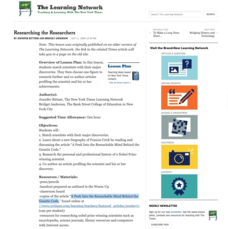Curated OER
Let There Be Peace: Nobel Prize Winners
What is the Nobel Peace Prize? After they establish criteria for great leadership, secondary learners read a New York Times article about President Jimmy Carter's acceptance of the Nobel Peace Prize in 2002. Individuals research the...
Curated OER
A Nobel Cause
Students research the lives and accomplishments of Nobel Prize-winning scientists and compose stories about what the world would be like without the accomplishments of these scientists.
Curated OER
Life in Letters
Students explore the relationship between an author's life and their work. Students research the historical and personal events surrounding a Nobel Prize winning author and how they are reflected in the author's writing. They create a...
Curated OER
She's All Over the Map
Students consider female authors and their literature. Working in partnerships, they research and map the life and work of a Nobel Prize-winning female author of their choice. Students write individual letters expressing their thoughts...
The New York Times
Researching the Researchers
Students match scientists with their major discoveries, choose one figure to research further, and co-author articles profiling the scientist and his or her achievements.
Curated OER
Make it a Hemingway Day
It’s always a good time to have your class read the works of this Nobel Prize recipient.
Curated OER
Breaking News English: Book Prizes
In this book prizes worksheet, students read the article, answer true and false questions, complete synonym matching, complete phrase matching, complete a gap fill, answer short answer questions, answer discussion questions, write, and...
National Endowment for the Humanities
Faulkner's As I Lay Dying: Concluding the Novel
As I Lay Dying is a beautiful book and a wonderful vehicle for understanding, interpreting, and comparing themes. The class reads and analyzes the novel, discusses possible interpretations, and characterizations. They compare the themes...
Curated OER
The "Nobel"est People
Students study the history of the Nobel Prize, research Nobel laureates in all six categories of the award, and recognize the connecting thread of those who win the Nobel Prize--the contribution of outstanding work and the work's affect...
Curated OER
Talking About a Resolution
Students explore Nobel Prize winning economist Thomas C. Schelling's strategic egonomics theory as it applies to making new year's resolutions. They make their own resolutions and develop plans to keep them using Schelling's strategies.
Curated OER
The Jungle Book Teacher's Notes
Rudyard Kipling's The Jungle Book is a childhood classic that readers of all ages enjoy. A teaching packet that includes instruction tips, comprehension strategies, background information on the book and author, and two fun worksheets.
Curated OER
Books Quiz 1
In this books quiz learning exercise, students complete a set of 20 questions about books and authors. Answers and links to additional activities are included.
Curated OER
Giving Without Borders
Students assess the mission, accomplishments and global impact of Doctors Without Borders, the medical relief organization awarded the 1999 Nobel Peace Prize. They analyze stories of recent work done in different countries around the world.
Curated OER
Rudyard Kipling's Rikki-Tikki-Tavi: Mixing Words and Pictures
Create meaningful illustrations to accompany stories in a web-based art and literacy lesson plan focused on "Rikki-Tikki-Tavi" by Rudyard Kipling. The class takes a virtual art safari with the Museum of Modern Art and then discusses how...
Curated OER
Who's Got Game? The Lion or the Mouse?
Discuss bullying, folk tales, and more using this resource. Learners read the story The Lion and the Mouse by Toni and Slade Morrison, engage in cause and effect activities, make predictions, and discuss bullying. This is a motivating...
Curated OER
Less is More: How to Write a Six-Word Memoir like Ernest Hemingway
Follow Ernest Hemingway's lead and lead and teach your pupils to write their own six-word memoir!
Curated OER
"Three Shots": Ernest Hemingway's Nick Adams
Analyze characterization in literature. Readers use "Three Shots," from The Nick Adams Stories by Ernest Hemingway and complete classroom activities that require them to apply literary analysis techniques. They write their own short...
Curated OER
Rudyard Kipling's "Rikki-Tikki-Tavi": Mixing Fact and Fiction
"Rikki-Tikki-Tavi," from The Jungle Book, offers young readers a chance to examine how Rudyard Kipling uses setting and personification to bring to life the brave mongoose who battles cobras to protect his family. Class members explore...
Curated OER
Public Deception
Students debate the ethics of prominent figures who are accused of deception. The standards of expectation that they have for famous people are examined in this lesson.
Curated OER
Thomas Jefferson
Students explore the accomplishments of world leaders. In this Thomas Jefferson activity, students list the accomplishments achieved by Jefferson and read his epitaph. Students then write epitaphs for recent world leaders or celebrities.
Yale University
"This is Not a Story to Pass On": Teaching Toni Morrison's Beloved
Tenth graders read "Beloved" by Toni Morrison. In groups, they research the life and works of Morrison and read a speech by Sojouner Truth. Using the novel, they discuss the experiences of slaves and the effect of slavery on their...
Curated OER
The Happy Game: Famous African Americans
Ten questions about famous African-Americans are presented in this interactive presentation. If a question is answered correctly, "Happy," the smiley face, is happy; if it is answered incorrectly, he is sad and sick. "Happy" will keep...
Curated OER
Naguib Mahfouz
In this famous leaders worksheet, students read a passage about Naguib Mahfouz and then complete a variety of in-class and homework activities to support comprehension, including partner interviews, spelling, cloze, synonym matches, and...
Curated OER
Darfur Now Lesson Four: The Messages of Darfur Now
Students explore the work in individuals that are part of Darfur Now. In this human rights lesson, students also analyze the message of Weisel's Not on Our Watch. Students create found poems pertaining to social responsibility and activism.

























